虚拟语气用法总结(超好_原创)
- 格式:ppt
- 大小:798.00 KB
- 文档页数:27
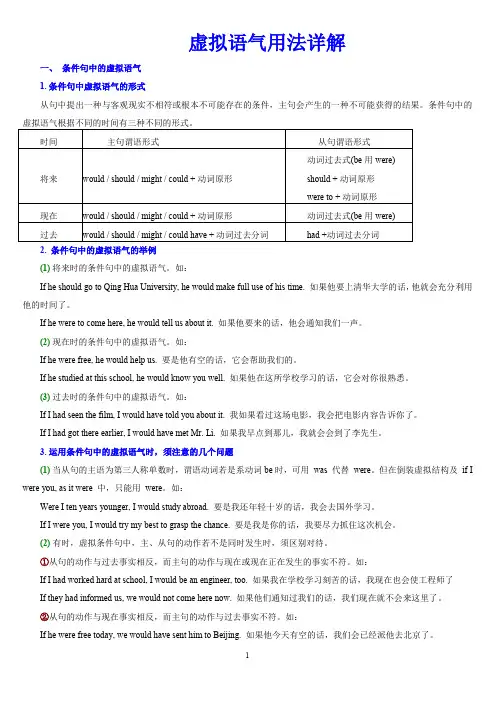
虚拟语气用法详解一、条件句中的虚拟语气1. 条件句中虚拟语气的形式从句中提出一种与客观现实不相符或根本不可能存在的条件,主句会产生的一种不可能获得的结果。
条件句中的2. 条件句中的虚拟语气的举例(1) 将来时的条件句中的虚拟语气。
如:If he should go to Qing Hua University, he would make full use of his time. 如果他要上清华大学的话,他就会充分利用他的时间了。
If he were to come here, he would tell us about it. 如果他要来的话,他会通知我们一声。
(2) 现在时的条件句中的虚拟语气。
如:If he were free, he would help us. 要是他有空的话,它会帮助我们的。
If he studied at this school, he would know you well. 如果他在这所学校学习的话,它会对你很熟悉。
(3)过去时的条件句中的虚拟语气。
如:If I had seen the film, I would have told you about it. 我如果看过这场电影,我会把电影内容告诉你了。
If I had got there earlier, I would have met Mr. Li. 如果我早点到那儿,我就会会到了李先生。
3. 运用条件句中的虚拟语气时,须注意的几个问题(1)当从句的主语为第三人称单数时,谓语动词若是系动词be时,可用was 代替were。
但在倒装虚拟结构及if I were you, as it were 中,只能用were。
如:Were I ten years younger, I would study abroad. 要是我还年轻十岁的话,我会去国外学习。
If I were you, I would try my best to grasp the chance. 要是我是你的话,我要尽力抓住这次机会。
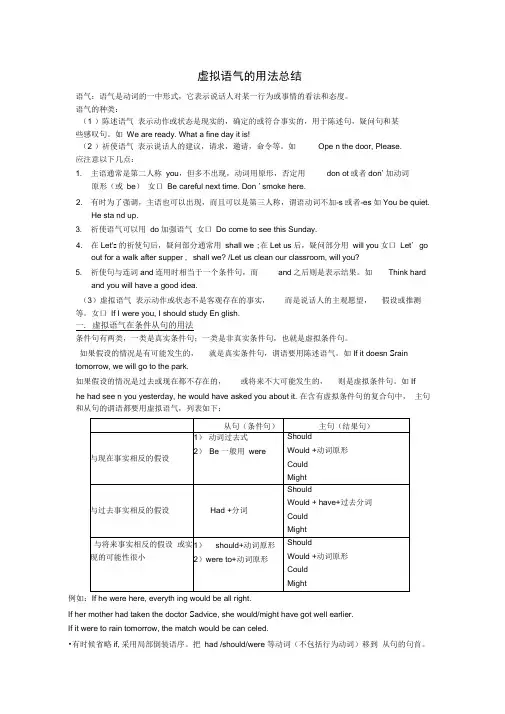
虚拟语气的用法总结语气:语气是动词的一中形式,它表示说话人对某一行为或事情的看法和态度。
语气的种类:(1 )陈述语气表示动作或状态是现实的,确定的或符合事实的,用于陈述句,疑问句和某些感叹句。
如We are ready. What a fine day it is!(2 )祈使语气表示说话人的建议,请求,邀请,命令等。
如Ope n the door, Please.应注意以下几点:1. 主语通常是第二人称you,但多不出现,动词用原形,否定用don ot或者don'加动词原形(或be)女口Be careful next time. Don 'smoke here.2. 有时为了强调,主语也可以出现,而且可以是第三人称,谓语动词不加-s或者-es如You be quiet.He sta nd up.3. 祈使语气可以用do加强语气女口Do come to see this Sunday.4. 在Let's的祈使句后,疑问部分通常用shall we ;在Let us后,疑问部分用will you女口Let' goout for a walk after supper , shall we? /Let us clean our classroom, will you?5. 祈使句与连词and连用时相当于一个条件句,而and之后则是表示结果。
如Think hardand you will have a good idea.(3)虚拟语气表示动作或状态不是客观存在的事实,而是说话人的主观愿望,假设或推测等。
女口If I were you, I should study En glish.一. 虚拟语气在条件从句的用法条件句有两类,一类是真实条件句;一类是非真实条件句,也就是虚拟条件句。
如果假设的情况是有可能发生的,就是真实条件句,谓语要用陈述语气。
如If it doesn S rain tomorrow, we will go to the park.如果假设的情况是过去或现在都不存在的,或将来不大可能发生的,则是虚拟条件句。
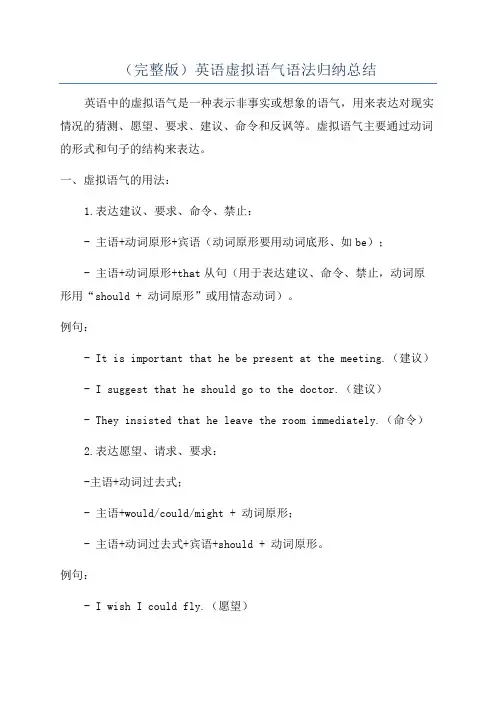
(完整版)英语虚拟语气语法归纳总结英语中的虚拟语气是一种表示非事实或想象的语气,用来表达对现实情况的猜测、愿望、要求、建议、命令和反讽等。
虚拟语气主要通过动词的形式和句子的结构来表达。
一、虚拟语气的用法:1.表达建议、要求、命令、禁止:- 主语+动词原形+宾语(动词原形要用动词底形、如be);- 主语+动词原形+that从句(用于表达建议、命令、禁止,动词原形用“should + 动词原形”或用情态动词)。
例句:- It is important that he be present at the meeting.(建议)- I suggest that he should go to the doctor.(建议)- They insisted that he leave the room immediately.(命令)2.表达愿望、请求、要求:-主语+动词过去式;- 主语+would/could/might + 动词原形;- 主语+动词过去式+宾语+should + 动词原形。
例句:- I wish I could fly.(愿望)- I would appreciate it if you could help me.(请求)3.表示虚拟条件:- If条件从句中的谓语动词用过去完成时,主句用would/should/might/could + have + 过去分词;- If条件从句中的谓语动词用过去时,主句用would/should/could + 动词原形。
例句:- If I had known his phone number, I would have called him.(虚拟条件)- If you had listened to me, we could have finished the project earlier.(虚拟条件)4.表达建议、要求、祝愿:- If only内部称述 + 主语 + 过去式。
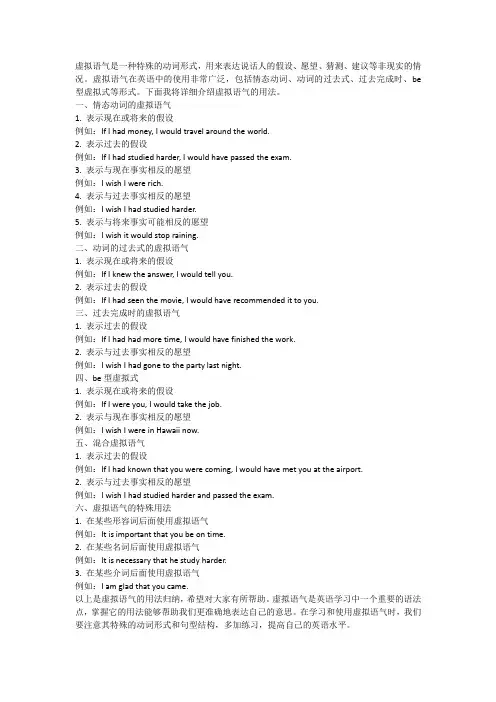
虚拟语气是一种特殊的动词形式,用来表达说话人的假设、愿望、猜测、建议等非现实的情况。
虚拟语气在英语中的使用非常广泛,包括情态动词、动词的过去式、过去完成时、be 型虚拟式等形式。
下面我将详细介绍虚拟语气的用法。
一、情态动词的虚拟语气1. 表示现在或将来的假设例如:If I had money, I would travel around the world.2. 表示过去的假设例如:If I had studied harder, I would have passed the exam.3. 表示与现在事实相反的愿望例如:I wish I were rich.4. 表示与过去事实相反的愿望例如:I wish I had studied harder.5. 表示与将来事实可能相反的愿望例如:I wish it would stop raining.二、动词的过去式的虚拟语气1. 表示现在或将来的假设例如:If I knew the answer, I would tell you.2. 表示过去的假设例如:If I had seen the movie, I would have recommended it to you.三、过去完成时的虚拟语气1. 表示过去的假设例如:If I had had more time, I would have finished the work.2. 表示与过去事实相反的愿望例如:I wish I had gone to the party last night.四、be型虚拟式1. 表示现在或将来的假设例如:If I were you, I would take the job.2. 表示与现在事实相反的愿望例如:I wish I were in Hawaii now.五、混合虚拟语气1. 表示过去的假设例如:If I had known that you were coming, I would have met you at the airport.2. 表示与过去事实相反的愿望例如:I wish I had studied harder and passed the exam.六、虚拟语气的特殊用法1. 在某些形容词后面使用虚拟语气例如:It is important that you be on time.2. 在某些名词后面使用虚拟语气例如:It is necessary that he study harder.3. 在某些介词后面使用虚拟语气例如:I am glad that you came.以上是虚拟语气的用法归纳,希望对大家有所帮助。
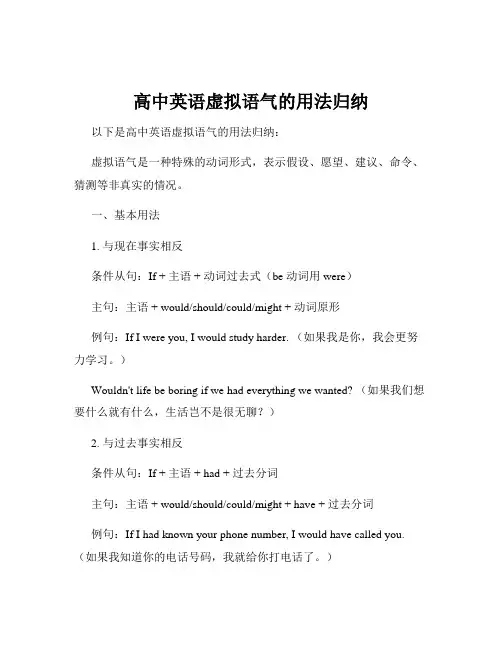
高中英语虚拟语气的用法归纳以下是高中英语虚拟语气的用法归纳:虚拟语气是一种特殊的动词形式,表示假设、愿望、建议、命令、猜测等非真实的情况。
一、基本用法1. 与现在事实相反条件从句:If + 主语 + 动词过去式(be 动词用 were)主句:主语 + would/should/could/might + 动词原形例句:If I were you, I would study harder. (如果我是你,我会更努力学习。
)Wouldn't life be boring if we had everything we wanted? (如果我们想要什么就有什么,生活岂不是很无聊?)2. 与过去事实相反条件从句:If + 主语 + had + 过去分词主句:主语 + would/should/could/might + have + 过去分词例句:If I had known your phone number, I would have called you. (如果我知道你的电话号码,我就给你打电话了。
)Couldn't you have done better if you had tried harder? (如果你再努力些,难道不能做得更好吗?)3. 与将来事实相反条件从句:① If + 主语 + 动词过去式② If + 主语 + were to + 动词原形③ If + 主语 + should + 动词原形主句:主语 + would/should/could/might + 动词原形例句:If it rained tomorrow, we would stay at home. (如果明天下雨,我们就待在家里。
)If she were to come here tomorrow, I would be very happy. (如果她明天来这儿,我会非常高兴。
)If he should fail in the exam, how disappointed his parents would be!(要是他考试不及格,他父母该多失望啊!)二、固定搭配1. wish 后的宾语从句与现在事实相反:从句用一般过去时与过去事实相反:从句用过去完成时与将来事实相反:从句用 would/could + 动词原形例句:I wish I were as tall as you. (我希望我和你一样高。
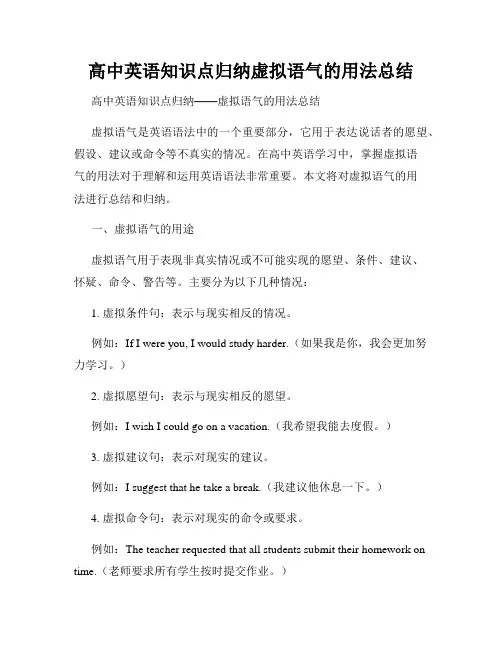
高中英语知识点归纳虚拟语气的用法总结高中英语知识点归纳——虚拟语气的用法总结虚拟语气是英语语法中的一个重要部分,它用于表达说话者的愿望、假设、建议或命令等不真实的情况。
在高中英语学习中,掌握虚拟语气的用法对于理解和运用英语语法非常重要。
本文将对虚拟语气的用法进行总结和归纳。
一、虚拟语气的用途虚拟语气用于表现非真实情况或不可能实现的愿望、条件、建议、怀疑、命令、警告等。
主要分为以下几种情况:1. 虚拟条件句:表示与现实相反的情况。
例如:If I were you, I would study harder.(如果我是你,我会更加努力学习。
)2. 虚拟愿望句:表示与现实相反的愿望。
例如:I wish I could go on a vacation.(我希望我能去度假。
)3. 虚拟建议句:表示对现实的建议。
例如:I suggest that he take a break.(我建议他休息一下。
)4. 虚拟命令句:表示对现实的命令或要求。
例如:The teacher requested that all students submit their homework on time.(老师要求所有学生按时提交作业。
)5. 虚拟警告句:表示对现实的警告或威胁。
例如:If you don't stop talking, I will call the police.(如果你不停止讲话,我会报警。
)二、虚拟语气的形式1. 虚拟语气在动词的形态上表现为过去式(一般过去时或过去完成时)。
例如:I suggested that he go to the library.(我建议他去图书馆。
)2. 虚拟语气在动词的形态上表现为"were"而不是"was"。
例如:If I were you, I would apologize.(如果我是你,我会道歉。
)3. 虚拟语气在情态动词的用法上表现为"should" + 动词原形。
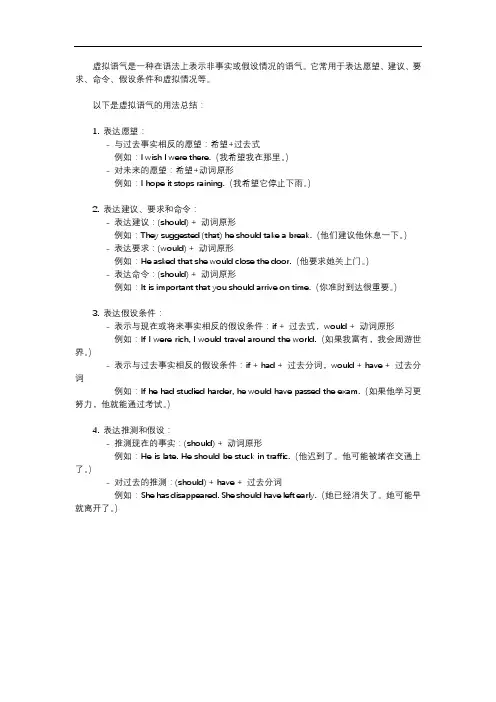
虚拟语气是一种在语法上表示非事实或假设情况的语气。
它常用于表达愿望、建议、要求、命令、假设条件和虚拟情况等。
以下是虚拟语气的用法总结:1. 表达愿望:- 与过去事实相反的愿望:希望+过去式例如:I wish I were there.(我希望我在那里。
)- 对未来的愿望:希望+动词原形例如:I hope it stops raining.(我希望它停止下雨。
)2. 表达建议、要求和命令:- 表达建议:(should) + 动词原形例如:They suggested (that) he should take a break.(他们建议他休息一下。
)- 表达要求:(would) + 动词原形例如:He asked that she would close the door.(他要求她关上门。
)- 表达命令:(should) + 动词原形例如:It is important that you should arrive on time.(你准时到达很重要。
)3. 表达假设条件:- 表示与现在或将来事实相反的假设条件:if + 过去式,would + 动词原形例如:If I were rich, I would travel around the world.(如果我富有,我会周游世界。
)- 表示与过去事实相反的假设条件:if + had + 过去分词,would + have + 过去分词例如:If he had studied harder, he would have passed the exam.(如果他学习更努力,他就能通过考试。
)4. 表达推测和假设:- 推测现在的事实:(should) + 动词原形例如:He is late. He should be stuck in traffic.(他迟到了。
他可能被堵在交通上了。
)- 对过去的推测:(should) + have + 过去分词例如:She has disappeared. She should have left early.(她已经消失了。
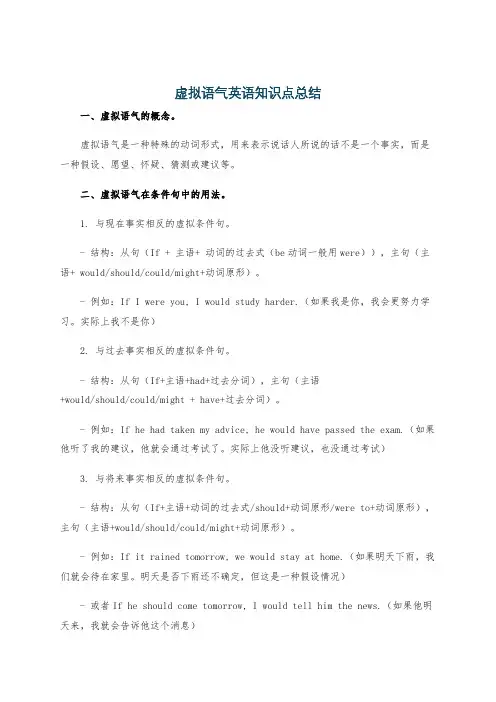
虚拟语气英语知识点总结一、虚拟语气的概念。
虚拟语气是一种特殊的动词形式,用来表示说话人所说的话不是一个事实,而是一种假设、愿望、怀疑、猜测或建议等。
二、虚拟语气在条件句中的用法。
1. 与现在事实相反的虚拟条件句。
- 结构:从句(If + 主语+ 动词的过去式(be动词一般用were)),主句(主语+ would/should/could/might+动词原形)。
- 例如:If I were you, I would study harder.(如果我是你,我会更努力学习。
实际上我不是你)2. 与过去事实相反的虚拟条件句。
- 结构:从句(If+主语+had+过去分词),主句(主语+would/should/could/might + have+过去分词)。
- 例如:If he had taken my advice, he would have passed the exam.(如果他听了我的建议,他就会通过考试了。
实际上他没听建议,也没通过考试)3. 与将来事实相反的虚拟条件句。
- 结构:从句(If+主语+动词的过去式/should+动词原形/were to+动词原形),主句(主语+would/should/could/might+动词原形)。
- 例如:If it rained tomorrow, we would stay at home.(如果明天下雨,我们就会待在家里。
明天是否下雨还不确定,但这是一种假设情况)- 或者If he should come tomorrow, I would tell him the news.(如果他明天来,我就会告诉他这个消息)- 以及If I were to see her tomorrow, I would give her the book.(如果我明天见到她,我就会把书给她)三、虚拟语气在宾语从句中的用法。
1. wish后的宾语从句。
- 表示与现在事实相反的愿望,从句谓语动词用过去式(be动词用were)。
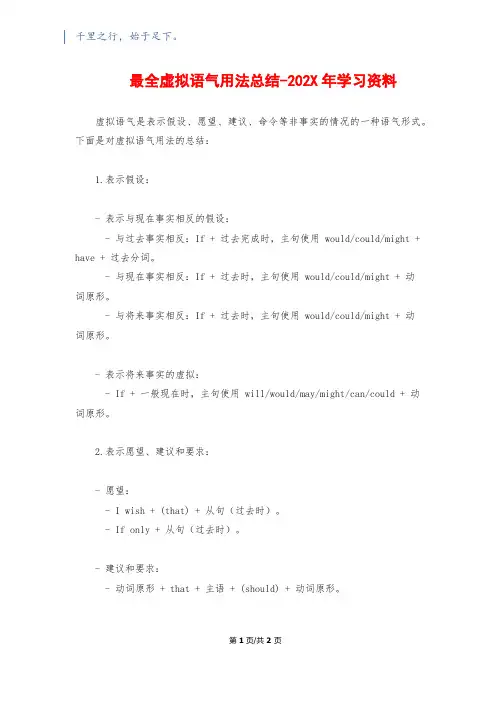
千里之行,始于足下。
最全虚拟语气用法总结-202X年学习资料
虚拟语气是表示假设、愿望、建议、命令等非事实的情况的一种语气形式。
下面是对虚拟语气用法的总结:
1.表示假设:
- 表示与现在事实相反的假设:
- 与过去事实相反:If + 过去完成时,主句使用 would/could/might + have + 过去分词。
- 与现在事实相反:If + 过去时,主句使用 would/could/might + 动
词原形。
- 与将来事实相反:If + 过去时,主句使用 would/could/might + 动
词原形。
- 表示将来事实的虚拟:
- If + 一般现在时,主句使用 will/would/may/might/can/could + 动词原形。
2.表示愿望、建议和要求:
- 愿望:
- I wish + (that) + 从句(过去时)。
- If only + 从句(过去时)。
- 建议和要求:
- 动词原形 + that + 主语 + (should) + 动词原形。
第1页/共2页
锲而不舍,金石可镂。
3.表示命令和建议:
- 命令:
- 动词原形 + that + 主语 + 动词原形。
- 建议:
- It is (high) time + 过去式 + (that) + 主语 + 过去式。
以上是对虚拟语气用法的简要总结。
在实际运用中,需要根据具体情况选择适当的虚拟语气形式来表达所需的意思。
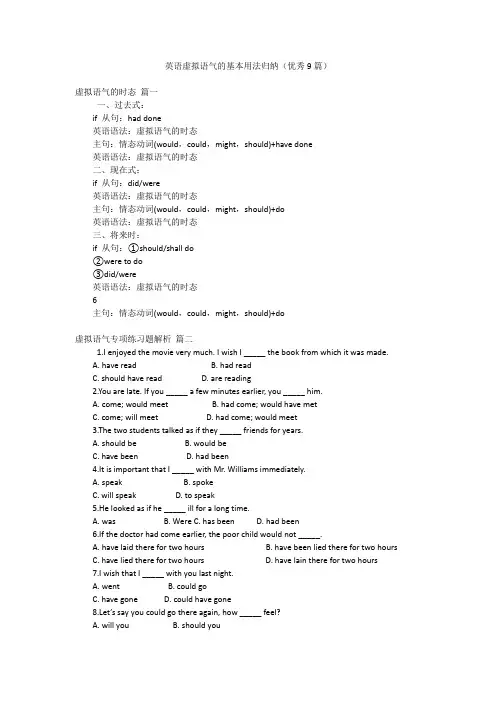
英语虚拟语气的基本用法归纳(优秀9篇)虚拟语气的时态篇一一、过去式:if 从句:had done英语语法:虚拟语气的时态主句:情态动词(would,could,might,should)+have done英语语法:虚拟语气的时态二、现在式:if 从句:did/were英语语法:虚拟语气的时态主句:情态动词(would,could,might,should)+do英语语法:虚拟语气的时态三、将来时:if 从句:①should/shall do②were to do③did/were英语语法:虚拟语气的时态6主句:情态动词(would,could,might,should)+do虚拟语气专项练习题解析篇二1.I enjoyed the movie very much. I wish I _____ the book from which it was made.A. have readB. had readC. should have readD. are reading2.You are late. If you _____ a few minutes earlier, you _____ him.A. come; would meetB. had come; would have metC. come; will meetD. had come; would meet3.The two students talked as if they _____ friends for years.A. should beB. would beC. have beenD. had been4.It is important that I _____ with Mr. Williams immediately.A. speakB. spokeC. will speakD. to speak5.He looked as if he _____ ill for a long time.A. wasB. WereC. has beenD. had been6.If the doctor had come earlier, the poor child would not _____.A. have laid there for two hoursB. have been lied there for two hoursC. have lied there for two hoursD. have lain there for two hours7.I wish that I _____ with you last night.A. wentB. could goC. have goneD. could have gone8.Let’s say you could go there again, how _____ feel?A. will youB. should youC. would youD. do you9.I can’t stand him. He always talks as though he _____ everything.A. knewB. knowsC. has knownD. had known10._____ the fog, we should have reached our school.A. Because ofB. In spite ofC. In case ofD. But for11.If you had told me in advance, I _____ him at the airport.A. would meetB. would had metC. would have metD. would have meet12.Mike can take his car apart and put it back together again. I certainly wish he_____ me how.A. teachesB. will teachC. has taughtD. would teach13.I would have told him the answer, had it been possible, but I _____ so busy then.A. had beenB. wereC. wasD. would be14.He’s working hard for fear that he _____.A. should fall behindB. fell behindC. may fall behindD. would fallen behind15.If it _____ another ten minutes, the game would have been called off.A. had rainedB. would have rainedC. have seenD. rained16.He suggested that they _____ use a trick instead of fighting.A. shouldB. wouldC. doD. had17.My father did not go to New York; the doctor suggested that he _____ there.A. not wentB. won’t goC. not goD. not to go18.I would have gone to the meeting if I _____ time.A. had hadB. have hadC. hadD. would have had19.Would you rather I _____ buying a new bike?A. decided againstB. will decide againstC. have decidedD. shall decide against20.You look so tired tonight. It is time you _____.A. go to sleepB. went to sleepC. go to bedD. went to bed21、—Why didn’t you buy a new car?—I would have bought one if I _____ enough money.A. hadB. have hadC. would haveD. had had22.If she could sew, _____.A. she make a dressB. she would have made a shirtC. she will make a shirtD. she would had made a coat23._____ today, he would get there by Friday.A. Would he leaveB. Was he leavingC. Were he to leaveD. If he leaves24.His doctor suggested that he _____ a short trip abroad.A. will takeB. would takeC. takeD. took25.The Bakers arrived last night. If they’d only let us know earlier,_____ at the station.A. we’d meet themB. we’ll meet themC. we’d have met themD. we’ve met them26.If I _____ you, I _____ more attention to English idioms and phrases.A. was; shall payB. am; will payC. would be; would payD. were; would pay27.We might have failed if you _____ us a helping hand.A. have not givenB. would not giveC. had not givenD. did not give28.The law requires that everyone _____ his car checked at least once a year.A. hasB. hadC. haveD. will have29.It is strange that he _____ so.A. would sayB. would speakC. should sayD. will speak30.Had I known her name, _____A. or does she know mine?B. and where does she live?C. she would be beautiful.D. I would have invited her to lunch.31.He has just arrived, but he talks as if he _____ all about that.A. knowB. knowsC. knownD. knew32.If I _____ the money, I would have bought a much bigger car.A. possessedB. ownedC. hadD. had had33.He was very busy yesterday; otherwise, he _____ to the meeting.A. would comeB. cameC. would have comeD. will come34.The librarian insists that John _____ no more books from the library before he returns all the books he has borrowed.A. will takeB. tookC. takeD. takes35.I left very early last night, but I wish I _____ so early.A. didn’t leaveB. hadn’t leftC. haven’t leftD. couldn’t leave36.I do not have a job. I would find one but I _____ no time.A. hadB. didn’t haveC. had hadD. have37.I wish that you _____ such a bad headache because I’m sure that you would have enjoyed the concert.A. hadn’tB. didn’t have hadC. hadn’t hadD. hadn’t have38.He insisted that we all _____ in his office at one o’clock.A. beB. to beC. would beD. shall be39.Helen couldn’t go to France after all. That’s too bad. I’m sure she would have enjoyed it if _____.A. she’s goneB. she’ll goC. she’d goneD. she’d go答案:1—5 BBDAD 6—10 DDCAD11—15 CDCAA 16—20 ACAAD21—25 DBCCC 26—30 DCCCD31—35 DDCCB 36—39 DCAC解析:1.wish后面用虚拟语气,表示与过去事实相反用过去完成时。
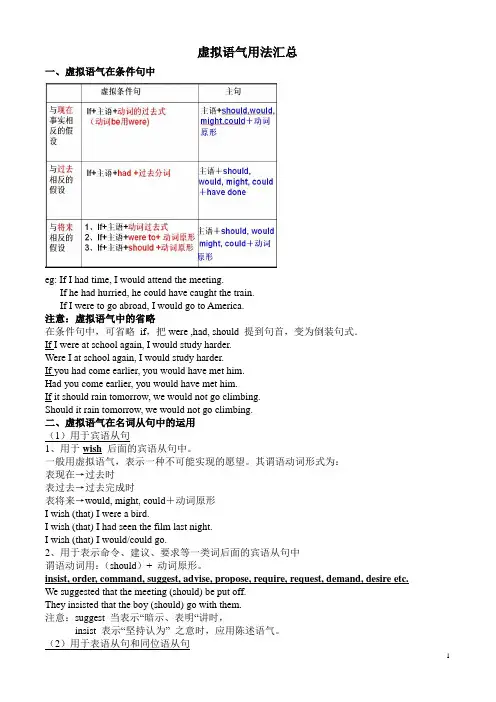
虚拟语气用法汇总一、虚拟语气在条件句中eg: If I had time, I would attend the meeting.If he had hurried, he could have caught the train.If I were to go abroad, I would go to America.注意:虚拟语气中的省略在条件句中,可省略if,把were ,had, should 提到句首,变为倒装句式.If I were at school again, I would study harder.Were I at school again, I would study harder.If you had come earlier, you would have met him.Had you come earlier, you would have met him.If it should rain tomorrow, we would not go climbing.Should it rain tomorrow, we would not go climbing.二、虚拟语气在名词从句中的运用(1)用于宾语从句1、用于wish后面的宾语从句中。
一般用虚拟语气,表示一种不可能实现的愿望。
其谓语动词形式为:表现在→过去时表过去→过去完成时表将来→would, might, could+动词原形I wish (that) I were a bird.I wish (that) I had seen the film last night.I wish (that) I would/could go.2、用于表示命令、建议、要求等一类词后面的宾语从句中谓语动词用:(should)+ 动词原形。
insist, order, command, suggest, advise, propose, require, request, demand, desire etc. We suggested that the meeting (should) be put off.They insisted that the boy (should) go with them.注意:suggest 当表示“暗示、表明“讲时,insist 表示“坚持认为”之意时,应用陈述语气。
虚拟语气用法总结(完整)if+主语+had+过去分词+其他+主语+should/would/could/might+have+过去分词+其他例:1.XXX,XXX如果我知道你要来,我就会准备些食物的。
(事实:我不知道)2.XXX,XXX.如果我当时研究更努力些,我就能通过考试了。
(事实:我没有用功研究)3、表示与将来事实相反的情况:if+主语+were/should+动词原形+其他+主语+would/could/might+动词原形+其他例:1.IfIwereyou,XXX.如果我是你,我不会那样做。
(将来:我不可能成为你)2.XXX,XXX.如果下雨了,带上这把伞。
(将来:不一定会下雨)1.If I had arrived earlier。
I would have been able to meet her。
(Fact: I arrived late)2.If he had XXX my advice。
he would not have made such a mistake。
(Fact: He didn't listen to me)3.If he were to come here tomorrow。
I would talk to him。
(Fact: It's XXX he will come)In expressing ns。
orders。
requests。
etc。
the subjunctive mood is often used in the object clause。
with the verb in the form of "should + infinitive," which can be omitted.Other uses of XXX:1.The subjunctive mood is used in the object clause after "wish" to express a XXX fact。
虚拟语气用法虚拟语气,又称“虚拟假设语气”,是指说话者或写作者在表达某种情况时,通过使用特定的语法形式来表示这种情况实际上并不存在或者与事实相反。
虚拟语气在英语中非常常见,它可以用来表达假设、愿望、建议、命令、推测等多种语境。
本文将介绍虚拟语气的各种用法及例句。
一、假设与现实相反的情况虚拟语气常用于表示与现实相反的情况或假设。
在这种情况下,谓语动词常以“would/could/should + 动词原形”或“were + 主语”等形式出现。
1. 虚拟语气用于假设:If I were rich, I would travel around the world.如果我有钱,我会环游世界。
If she had studied harder, she could have passed the exam.如果她学得更努力,她本来可以通过考试的。
2. 虚拟语气用于愿望:I wish I were taller.我希望我更高一些。
I wish you wouldn't be late for the meeting.我希望你不要迟到开会。
3. 虚拟语气用于建议:I suggest that he should see a doctor.我建议他去看医生。
It is recommended that every student study English.建议每个学生都学习英语。
二、与过去事实相反的情况虚拟语气还常用于表示与过去事实相反的情况。
在这种情况下,主要使用“had + 过去分词”形式或其他相应的虚拟语气结构。
1. 虚拟语气用于与过去事实相反的条件:If he had arrived earlier, he would have caught the train.如果他早点到,他就能赶上火车了。
If I had known you were coming, I would have prepared dinner.如果我知道你要来,我就会准备晚餐了。
虚拟语气的用法和常见表达方式总结虚拟语气是一种特殊的语气形式,用来表示说话人的主观愿望、假设、怀疑、命令、建议等非现实或未实现的情况。
在语法上,虚拟语气与实际情况相反,常常用于条件句、表达愿望、建议或是疑问等场景。
本文将总结虚拟语气的用法和常见表达方式,以帮助读者更好地理解和运用。
虚拟语气的用法一:表示与现实相反的假设1. 条件句中的虚拟语气在表示与现实相反的假设情况下,常用“如果”、“要是”等引导词引导条件句。
在这种情况下,主句中的谓语动词需使用虚拟语气形式。
例如:如果我是你,我会早点睡觉。
(表示与现实相反的假设)要是明天下雨,我们就不去郊游了。
2. 表达愿望或建议的虚拟语气虚拟语气可以用来表达说话人的愿望、建议或期待。
常用“希望”、“愿意”、“要求”等词语来引导虚拟语气。
例如:我希望你能理解我的困扰。
我要求你们准时参加会议。
3. 表示命令、建议或要求的虚拟语气虚拟语气可以在表示命令、建议或要求时使用,常用“要求”、“建议”、“命令”等引导词来引导虚拟语气。
例如:我建议你明天早点来上班。
我命令你立刻停止打架。
虚拟语气的用法二:表示对过去事件的假设1. 表示对过去事件的虚拟语气虚拟语气在表示对过去事件的假设时,常通过使用“如果”加上过去完成时的虚拟语气。
例如:如果我当初选了理科,现在就不会后悔了。
要是我没有迟到,老师就不会生气了。
2. 表示对过去行为的懊悔与后悔当我们对过去的行为感到懊悔或后悔时,可以使用虚拟语气来表达这种情绪。
例如:要是我早点听从父母的劝告,就不会犯那么多错误了。
虚拟语气的用法三:表示建议、要求或推测1. 表示建议、要求或推测的虚拟语气虚拟语气可以用来表示建议、要求或推测的情况。
常用“要求”、“建议”、“推测”等引导词语来引导虚拟语气。
例如:我建议你今天早点休息。
我推测他可能已经离开了。
2. 表示对不可能实现的要求虚拟语气也可以用于表示对不可能实现的要求。
常用“要求”、“期望”等引导词语来引导虚拟语气。
虚拟语气全部用法总结虚拟语气是英语中的一种语气,用于表达假设、愿望、建议、命令等语境。
在英语中,虚拟语气的用法非常广泛,下面我们来总结一下虚拟语气的全部用法。
1. 表达假设虚拟语气可以用来表达假设,即表示某种情况或事件是假设的、不确定的或未实现的。
例如:- If I were you, I would study harder.(如果我是你,我会更努力学习。
)- If I had more money, I would travel around the world.(如果我有更多的钱,我会环游世界。
)2. 表达愿望虚拟语气还可以用来表达愿望,即表示某种情况或事件是希望实现的,但实际上并没有实现。
例如:- I wish I could speak fluent English.(我希望我能说一口流利的英语。
)- If only I had more time, I could finish this project.(要是我有更多的时间,我就能完成这个项目了。
)3. 表达建议虚拟语气还可以用来表达建议,即表示某种情况或事件是建议的,但并不一定会实现。
例如:- I suggest that you take a break and relax.(我建议你休息一下,放松一下。
)- If I were you, I would go to the doctor and get a check-up.(如果我是你,我会去看医生做个检查。
)4. 表达命令虚拟语气还可以用来表达命令,即表示某种情况或事件是命令的,但并不一定会被执行。
例如:- I demand that you apologize to me right now.(我要求你立刻向我道歉。
)- If I were your boss, I would fire you for being late.(如果我是你的老板,我会因为你迟到而解雇你。
)5. 表达虚拟条件虚拟语气还可以用来表达虚拟条件,即表示某种情况或事件是虚构的、不存在的或不可能实现的。
虚拟语气的用法与情况总结虚拟语气是一种用来表达非事实的语气,它主要用于表示说话者的愿望、建议、推测、假设等情况。
在中文中,虚拟语气通常通过动词形式的变化或者使用特定的语气词来表达。
在下文中,将对虚拟语气的主要用法进行总结。
一、表示愿望虚拟语气可用来表达说话者的愿望或希望,常见的情况如下:1. 希望某事发生:- If only + 主语 + 过去式- I wish/If only + 主语 + would/could + 动词原形例如:- If only I had more free time to relax.- I wish I could visit Paris someday.2. 表示对过去事实的悔恨:- I wish/If only + 主语 + had + 过去分词例如:- I wish I had studied harder for the exam.二、表示建议或命令虚拟语气还可以用来表示建议或命令的情况,常见的用法如下:1. 建议:- (I suggest/recommend) + (that) + 主语 + (should) + 动词原形例如:- I suggest that you should take a break and relax.2. 命令:- (I demand/insist) + (that) + 主语 + (should) + 动词原形例如:- I demand that he should apologize for his behavior.三、表示假设当我们讨论假设、虚构或与事实相反的情况时,虚拟语气可用来表达,常见的情况如下:1. 虚拟条件句:- If + 主语 + 过去式,主语 + would/could/might + 动词原形例如:- If I were rich, I would travel the world.2. 虚拟假设:- If + 主语 + were,主语 + would/could/might + 动词原形例如:- If I were you, I would apologize to her.四、表示推测或假设除了表示真实的假设,虚拟语气还可以用来表示推测或假设的情况,常见的用法如下:1. 推测:- It is (high/about) time + 主语 + (过去式)例如:- It is high time you went to bed.2. 假设:- Suppose + 主语 + (过去式)例如:- Suppose she didn't arrive on time, what would you do?综上所述,虚拟语气被广泛应用于表达愿望、建议、推测和假设等情况。
英语虚拟语气语法总结虚拟语气常常使学习英语的人感到困惑。
它需要我们以想象的方式来表达一种与事实不符的情况或假设。
在这篇文章中,我们将对英语虚拟语气进行总结并提供一些实用的例子。
一、虚拟语气的形式和用法虚拟语气的形式主要有:1. 过去式虚拟:用于表示与现在事实相反的情况。
例如:"If I were rich, I would buy a yacht."(如果我富有,我会买一艘游艇。
)2. 过去完成式虚拟:用于表示与过去事实相反的情况。
例如:"If she had studied harder, she would have passed the exam."(如果她学得更努力,她本来会通过考试的。
)3. 条件句中的虚拟语气:用于表示与现在或将来事实相反的情况。
例如:"If I had more time, I would go on a vacation."(如果我有更多时间,我会去度假。
)4. 愿望虚拟语气:用于表示对目前或过去情况的希望、期待。
例如:"I wish I were taller."(但事实是我并不高。
)二、虚拟语气的用法详解1. 表示虚拟条件的句子虚拟条件句常常由“if”引导,其中包含一个假设性的陈述。
在这种情况下,我们使用过去时态来表示与现在事实相反的情况。
例如:"If Iwere you, I would apologize."(如果我是你,我会道歉。
)这里的“were”是过去式虚拟的一种形式,用来表示与现实情况不符的假设。
2. 表示与过去事实相反的虚拟语气过去完成式虚拟经常出现在假设条件中。
例如:"If she had told him the truth, he wouldn't have been angry."(如果她告诉了他真相,他不会生气。